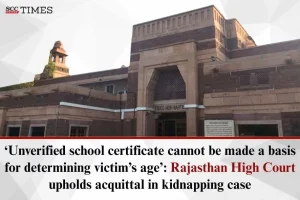Rajasthan High Court: In a criminal revision petition filed by the complainant challenging the Trial Court’s order of acquittal of the accused in alleged abduction and rape, a Single-Judge Bench of Farjand Ali, J., dismissed the petition held that unverified school certificate cannot be made basis to determine the age of the victim. The Court further held victim’s statements did not inspire confidence to hold the accused guilty for an offence of rape.
Background
A report was filed by the complainant, alleging that his daughter ‘S’ was taken away by the accused, for the purpose of marrying her. An FIR was lodged, and victim was recovered, and the accused was arrested. A charge sheet was submitted against the accused for offences under Sections 363, 366, and 376 of the Penal Code, 1860 (‘IPC’). The primary points of determination before the trial court were whether the victim was a minor and whether she was subjected to rape. The trial court acquitted the accused of all charges. The present criminal revision petition was filed by the complainant and the criminal appeal was filed by the State challenging the acquittal by the Trial Court.
Analysis and Decision
The Court noted that to convict the accused under Section 363 of the IPC, two things are to be established beyond reasonable doubt. One that she was below the age of 18 years and other would be that she was taken away from her lawful guardianship without consent of the guardians.
The Court observed that to prove the date of birth of the victim the evidence tendered was a certificate issued by School wherein the date of birth of victim was 04-06-1992. However, the complainant admitted in cross-examination that he did not know his daughter’s date of birth before lodging the police report, and that the date of birth was not mentioned in the FIR or his initial statement. Further, the school certificate was not produced before investigating officer so that investigation could be done regarding its genuineness. The Court observed that the document’s veracity was doubtful as the original admission form or school register was not produced, nor was any school staff examined to authenticate it, as required under Section 35 of the Evidence Act, 1872. The Court observed that a certificate, veracity of which is not known as to who issued it, cannot be made basis to determine the age of any incumbent and hence the school certificate cannot be made a basis for determining the age of victim. The Trial Court was correct in discarding the document.
The Court noted that the prosecution relied upon a document prepared by medical officer which estimated the victim’s age to be between 15 and 17 years. The Court noted that the ossification test report is based upon an opinion given by a radiologist based on the appearance of epiphysis and fusion of margins of the bones. A radiologist or medical jurist based on his experience and the formula given in the test of medical jurisprudence makes an idea regarding the estimate age of a person, however, it always remains an estimate. The Court observed that these opinions of radiologist or medical officer cannot determine the definite age of the victim and always has a margin of error of two years. The Court observed that the Trial Court was correct in its finding about absence of material of impeccable quality or clinching evidence on record to establish the fact with certainty that the victim was below age of 18 years at relevant of time. The Court also observed that the victim left her home clandestinely and joined the association of the appellant at her free will, concluding that the offences under Sections 363 and 366 of the IPC were not made out.
On the charge of rape under Section 376 of the IPC, the Court observed the victim’s statements to be contradictory. The Court found significant incongruence and contradiction between her statement under Section 164 of the Criminal Procedure Code (CrPC) and her testimony during the trial, leading to the conclusion that she was a consenting party and was neither coerced nor forced.
The Court noted that while hearing appeal against judgment of acquittal the courts should be slow or show reluctance and circumspect any interference in the judgment, unless it is a product of total non-consideration of material brought on record, mis-appreciation of evidence or based on erroneous interpretation of law.
The Court held that the victim’s evidence did not inspire confidence to convict the accused of rape and that the trial court’s appreciation of the evidence was prudent and in consonance with the law. The Court dismissed both the revision petition and the appeal.
[Raisuddin v. State of Rajasthan, 2025 SCC OnLine Raj 3770, decided on 29-07-2025]
Advocates who appeared in this case:
For the Petitioner: Anand Purohit, Sr. Advocate with Vikram Singh, Advocate
For the Respondent: Shrawan Singh Rathore, Dy.G.A., HM Saraswat, Advocate


